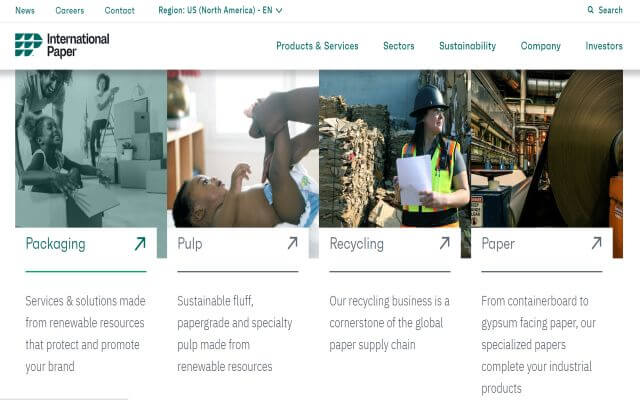The top companies in basic industries are Procter & Gamble Company, Chevron Corporation, Cargill, and ExxonMobil. These companies employ millions of people in the United States. More so, these companies contribute significantly to the economy of the US and even the world.
Overview of the Basic Industries Field
The basic industries field encompasses a broad range of industries involved in the production and manufacturing of goods. This sector is often referred to as the primary sector of the economy, as it involves the extraction and processing of natural resources.
According to the Bureau of Labor Statistics (BLS), the basic industries field has seen moderate growth in recent years. BLS projects that employment in the basic industries field will increase by 3% in a decade.
Types of Basic Industries Companies
Before you choose a career, you should understand the various types of basic industries companies. Having a fair knowledge of these companies allows you to pursue the appropriate learning path and acquire industry-relevant skills.
5 major types of basic industries companies
1. Agricultural basic companies
Food is a necessity in every household, making these companies one of the most important industries of the twenty-first century. Restaurants rely on agricultural basic industries for raw materials such as rice, fruits, vegetables, and coffee. These companies also ship raw materials to other companies so that they can be refined into food products.
These companies work with both large and small-scale farmers across the country to find the best food raw materials. Agricultural companies can also produce their raw materials by purchasing land and engaging in large-scale farming. You can work as a farmer, food scientist, agronomist, or plant or animal scientist in agricultural basic companies.
2. Mining basic companies
Mining is also a lucrative sector because raw materials needed in the construction, fashion, and auto industries are derived from the ground. These companies assess various locations for their suitability for the extraction of raw materials.
These pre- and post-mining processes offer numerous job opportunities. Working as a geoscientist, geological engineer, mining electrician, heavy equipment operator, or chemist are all options.
3. Wood and pulp basic companies
Wood and pulp companies harvest trees and other forestry products and refine them through an advanced manufacturing process. The raw material is then used in construction or furniture manufacturing.
Despite the introduction of technological devices and software, the paper industry continues to thrive. Raw materials derived from this sector are used by businesses to make paper, tissue and, books, packaging materials. You can work as a logger, researcher, paper mill operator, or salesperson in this sector.
4. Chemical basic companies
The extraction of organic and inorganic raw materials is required for the production of basic chemicals. These industries generate new and valuable compounds that are essential to the chemical industry as a whole.
Not all chemical manufacturers are classified as basic industries. Synthetic chemists create chemicals that are complex in nature and are classified as non-basic industries. The chemical industry has a large impact on many other industries, including plastics, food, automobiles, and glass.
5. Oil and gas extraction basic companies
Oil and gas extraction businesses operate and develop oil and gas. These operations also include crude petroleum production, mining, and oil extraction from oil shale and oil sands.
The extraction of oil and gas is a critical basic industry. Some aspects of this subsector require highly specialized processes performed by trained engineers or petroleum geologists.
Top 10 Companies in the basic industries field
As stated above, the basic industries contribute significantly to the growth of the nation’s GDP. More so, these companies are one of the biggest employers of labor in the US. It is probably because the basic industries are vast and diverse, with room for numerous opportunities for professionals and entry-level applicants.
Here are some of the leading companies in basic industries.
1. General Electronics

Size: 189,000 employees
Market Capitalization: $ 115 billion
Headquarters: Boston, Massachusetts, USA
CEO: H. Lawrence Culp Jr.
The General Electric Company (GE) is a multinational conglomerate based in Boston, Massachusetts. Charles A. Coffin, Thomas Edison, and J. P. Morgan founded the company in 1892. Currently, it employs over 189,000 people worldwide. It is present in over 100 countries around the world.
GE is active in a wide range of industries, including healthcare, aviation, the digital industry, power, additive manufacturing, and renewable energy. Jet engines, electric and electronic equipment, financial services, and much more are among GE’s notable products and services.
2. Cargill Inc.
Size: 155,000 employees
Market Capitalization: N/A
Headquarters: Minneapolis, Minnesota, USA
CEO: David MacLennan
Cargill is a privately held multinational corporation based in Minnetonka, Minnesota. William Cargill founded the company in 1865, and it now employs over 155,000 people worldwide. It operates in 66 countries and is involved in a variety of industries, including agriculture, food, and beverage.
Cargill is America’s largest privately held company and one of the world’s largest providers of food and agricultural products.
3. Procter & Gamble Company
Size: 97,000 employees
Market Capitalization: $ 351 billion
Headquarters: Cincinnati, Ohio, USA
CEO: David S. Taylor
This is a multinational consumer goods corporation based in Cincinnati, Ohio. William Procter and James Gamble founded the company in 1837. It employs over 97,000 people globally and operates in more than 80 countries.
Procter & Gamble is a major manufacturer of a wide range of consumer goods, including soap, detergent, cosmetics, food, and beverages. Many well-known brands sell the company’s products, including Tide, Pampers, Ariel, Gillette, and Oral-B. Procter & Gamble has a long history of innovation and is consistently ranked among the most valuable brands in the world.
4. ExxonMobil
Size: 73,000 employees
Market Capitalization: $201 billion
Headquarters: Irving, Texas, USA
CEO: Darren W. Woods
This is a multinational oil and gas corporation based in Irving, Texas. Exxon and Mobil merged in 1999 to form the company, which employs over 73,000 people worldwide. It has operations in over 38 countries and manufactures in 23. ExxonMobil is the largest oil company in the United States, as well as one of the largest in the world.
The primary activities of the corporation are petroleum, natural gas, coal, nuclear fuels, chemicals, and mineral ores. ExxonMobil is a major producer of synthetic rubber and plastics. The company has a significant presence in the upstream oil and gas industry and is one of the world’s largest refiners and marketers.
5. International Paper

Size: 50,000 employees
Market Capitalization: $26 billion
Headquarters: Memphis, Tennessee, USA
CEO: Mark Sutton
International Paper is a multinational pulp and paper corporation based in Memphis, Tennessee. The company was founded in 1898 and currently employs over 50,000 people worldwide. It has over 25000 customers in 150 countries worldwide. International Paper is the world’s largest paper company.
The company is divided into three divisions: industrial packaging, printing papers, and consumer packaging. Corrugated packaging, envelopes, commercial printing papers, office papers, and other items are available from the company.
6. Chevron Corporation
Size: 48,000 employees
Market Capitalization: $ 228 billion
Headquarters: San Ramon, California, USA
CEO: Michael Wirth
This is a multinational American energy corporation based in San Ramon, California. The company was founded in 1906 and currently employs over 48,000 people worldwide. It has a presence in over 180 countries and is involved in a variety of businesses, such as upstream oil and gas exploration.
Chevron is a major player in the global energy market and one of the world’s largest oil and gas companies. North America, South America, Africa, Europe, and the Middle East are among the regions in which the company operates. Chevron is also a major producer of natural gas in the United States.
7. PPG Industries
Size: 47,000 employees
Market Capitalization: $ 40 billion
Headquarters: Pittsburgh, Pennsylvania, USA
CEO: Michael H. McGarry
PPG Industries, Inc. is a multinational chemical corporation based in Pittsburgh, Pennsylvania. The Pittsburgh Plate Glass Company was founded in 1883 and now employs over 47,000 people worldwide. It is present in over 70 countries worldwide.
This company manufactures and distributes a wide range of products for the automotive, aerospace, construction, packaging, and industrial markets. PPG’s notable brands include Glidden paint, Olympic paint, Pittsburgh Paints, and others. As of 2021, they are the world’s second-largest paint company by revenue.
8. Dow Chemical Company
Size: 37,000 employees
Market Capitalization: $ 91 billion
Headquarters: Midland, Michigan, USA
CEO: Jim Fitterling
Dow Chemical Company is an American multinational chemical corporation headquartered in Midland, Michigan, and a subsidiary of Dow Inc. Herbert Henry Dow founded the company in 1897, and it now employs over 37,000 people worldwide. It has a global presence in 160 countries.
Dow is known as the “chemical company” for chemical companies because it manufactures products for industries other than end users. The company also produces plastics and agricultural products in addition to chemicals.
9. Newmont Mining Corporation
Size: 14,000 employees
Market Capitalization: $ 48 billion
Headquarters: Greenwood Village, Colorado, USA
CEO: Tom Palmer
Newmont Mining Corporation is a gold mining corporation based in Greenwood Village, Colorado. The company was founded in 1921 and is now the largest mining company in the world. They own gold mines in Australia, Ghana, Peru, and the United States, among other places. The company employs over 14,000 people worldwide.
Newmont is the only gold company on the S&P 500 Index. In addition to gold, the company is a major producer of copper, zinc, lead, and silver. Newmont has an impressive portfolio of long-term operating mines as well as a pipeline of development and exploration projects.
10. Rudolph and Sletten

Size: 1,500 employees
Market Capitalization: N/A
Headquarters: Redwood City, California, USA.
CEO: Martin Sisemore
Rudolph and Sletten is a California-based American construction company with regional offices in San Diego, Roseville, Irvine, and San Francisco. O.H. Rudolph and Kenneth G. Sletten founded the company in 1959. It now employs over 1,500 people.
Rudolph and Sletten are one of the country’s largest general contractors, specializing in the construction of healthcare, education, and industrial facilities.
Table showing the top 10 companies in the basic industries field.
| Company | No. of Employees | Headquarters | Market Capitalization ($) |
| General Electronics | 189,000 | Boston, Massachusetts, USA | $ 115 billion
|
| Cargill Inc.
| 155,000 | Minneapolis, Minnesota, USA | N/A |
| Procter & Gamble Company
| 97,000 | Cincinnati, Ohio, USA | $351 billion
|
| ExxonMobil
| 73,000 | Irving, Texas, USA
| $201 billion
|
| International Paper
| 50,000 | Memphis, Tennessee, USA | $26 billion
|
| Chevron Corporation
| 48,000 | San Ramon, California, USA | $ 228 billion
|
| PPG Industries | 47,000 | Pittsburgh, Pennsylvania, USA
| $ 40 billion
|
| Dow Chemical Company
| 37,000 | Midland, Michigan, USA | $ 91 billion
|
| Newmont Mining Corporation
| 14,000 | Greenwood Village, Colorado, USA
| $ 48 billion
|
| Rudolph and Sletten
| 1,500 | Redwood City, California, USA.
| N/A |
Commonalities of the basic industries
The basic industries are those that extract and process raw materials from the earth. They are also known as primary industries. Agriculture, mining, forestry, and fishing are examples of basic industries.
Here are 5 commonalities of the basic industries:
1. They are labor-intensive
Basic industries such as farming, mining, and fishing frequently require a significant amount of manual labor. These workers are frequently required to perform physically demanding tasks and work long hours.
2. They are heavily influenced by natural resources
Basic industries rely on the availability of natural resources such as water, land, and minerals. Weather, climate, and natural disasters can all have a significant impact on these industries.
3. They are often located in rural areas
Basic industries are frequently located in rural areas with abundant natural resources. These areas may have fewer job opportunities and less infrastructure than urban areas.
4. They are important to the economy
Basic industries are an important part of many economies, providing jobs and raw materials for a variety of products. They can also help other industries, such as manufacturing and transportation
5. They face regulatory challenges
Various regulations govern basic industries, with the goal of protecting the environment, ensuring worker safety, and preventing natural resource damage. These regulations can increase the costs and complexity of these industries’ operations.
How to Get a Job Offer from companies in the basic industries
If you find the basic industries fascinating, you might want to consider working in this sector. How do you go about it? Getting a job offer from companies in basic industries requires some effort and strategic planning.
Here’s a step-by-step guide to getting a job offer from basic industries companies
1. Identify the companies in basic industries
Agriculture, mining, construction, manufacturing, and transportation are examples of basic industries. Research and identify the companies that operate in these industries and are located in your desired location.
2. Make a customized resume and cover letter
Customize your resume and cover letter to highlight your relevant skills and experiences for the job and industry. Emphasize your work experience in basic industries or transferable skills that can be applied to the industry.
3. Build relationships with basic industries professionals
Contact people in your network who work in basic industries or know someone who does. Attend industry events and conferences, and join industry-related professional associations.
4. Apply for open positions in basic industries
Look for open positions that match your skills and experience on job boards and company websites. Apply for jobs that interest you and match your qualifications.
5. Follow up
After applying for a job, contact the company to express your interest and inquire about the status of your application. This demonstrates your eagerness and enthusiasm for the position.
6. Prepare for interviews
If you are invited to an interview, research the company and the industry beforehand. Prepare to answer questions about your relevant experience and skills for the job and industry.
7. Be patient
It takes time to get a job offer, so be patient and keep applying for other positions while you wait to hear back from companies.
What Companies in the Basic Industries Field Look For When Hiring
Companies in the basic industries field are looking for candidates who are technically skilled, safety-conscious, and able to work effectively in a team environment.
7 skills basic industries companies look for when hiring
1. Technical expertise
Candidates with strong technical skills and knowledge of the industry’s best practices are highly valued in the basic industries field. Technical expertise can include knowledge of specific software, machinery, and equipment.
2. Problem-solving skills
The ability to identify and solve problems quickly and efficiently is crucial in the basic industries field. Companies look for candidates who can think critically, work well under pressure, and can troubleshoot issues that may arise during production or construction.
3. Attention to detail
Precision and accuracy are essential in the basic industries field. Companies want candidates who pay attention to detail and can maintain high levels of quality control throughout the production process.
4. Safety Awareness
Basic industries often involve hazardous materials and environments, so companies look for candidates who are safety-conscious and can follow strict safety protocols.
5. Teamwork
Basic industries rely on teams of skilled workers to complete projects efficiently. Companies want candidates who can work well in a team environment, communicate effectively, and collaborate with others to achieve shared goals.
6. Adaptability
Basic industries can be subject to rapid changes in demand, technology, and regulations. Candidates who can adapt to these changes and remain flexible in their approach are highly valued.
7. Leadership potential
Candidates who demonstrate leadership potential, such as the ability to take the initiative and guide others, may be considered for supervisory or management positions in the future.
Conclusion: What Companies are in the basic industries? | Top 10
As we have seen, each company in the basic industries field is a market leader in its respective industry. Whether it’s chemicals, agriculture, mining, or manufacturing, these companies will remain at the forefront of their respective industries for many years.
FAQs on What Companies are in the Basic Industries?
Is it necessary to have engineering skills to work in basic industries?
No. Working in basic industries does not necessitate engineering skills. Many jobs in the basic industries, however, require a background in engineering.
How long does it take to find work in the basic industries?
Finding a job in the basic industries doesn’t take too long. This is because there are numerous job opportunities in this industry.
Which job in the basic industries field is the simplest to obtain?
Entry-level jobs are typically the easiest to obtain. These positions are available in a variety of business sectors, including accounting, administration, sales, information technology, and construction.








